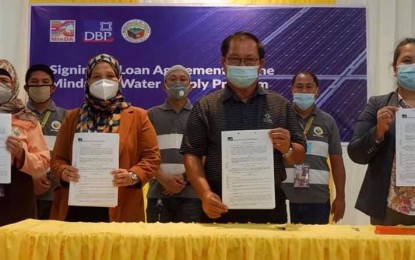
WATER SUPPLY. Taraka Mayor Nashimba Sumagayan (2nd from left), Mindanao Development Authority (MinDA) Secretary Emmanuel Piñol and Development Bank of the Philippines (DBP) representative Angelita Aguhob (right) show the signed documents of the PHP218 million worth loan agreement for the Mindanao Water Supply Program in Taraka, Lanao del Sur on Tuesday (June 30, 2020). Part of the loan will also be used to buy infrastructure equipment to build road networks in the town. (MinDA photo)
DAVAO CITY – The municipality of Taraka, Lanao del Sur, Development Bank of the Philippines (DBP), and the Mindanao Development Authority (MinDA) on Tuesday signed a PHP218 million worth of loan agreement for the MinDA Water Supply Program (MWSP) in the province.
The MWSP is composed of three major components: Potable Water System (PWS), Solar Power Irrigation System (SPIS), and agricultural heavy equipment for farmers.
The PWS will address the lack of potable water supply in the different barangays, while SPIS will assist the farmers by providing an alternative source of irrigation system powered by solar energy.
“This poor town beside the vast Lake Lanao will soon build six solar-powered irrigation projects for its rice farmers and a huge potable water system for its residents,” MinDA chairperson Emmanuel Piñol said in a Facebook post on Wednesday.
He added that the projects would be funded by the DBP under the MinDA Water Supply Program. Part of the loan will be used to buy infrastructure equipment to build road networks in the town.
“Today, we are signing a pivotal document that will change the lives of the people, and will make Taraka as a model community of self-reliance and rural development,” Piñol said.
Taraka, which has been selected as the model town for rural development by MinDA, is one of the oldest towns in Lanao del Sur with a very high poverty level.
Its residents depend on the Taraka River for their household water needs while its rice fields estimated at 2,000 hectares could harvest once a year because of the absence of an irrigation system.
He also encouraged other local government units (LGUs) not to be "afraid" to borrow money from banking institutions and must not merely rely on government support during the pandemic.
“If you are borrowing money from the bank, you are actually advancing the development of your municipality for the next 10 years. Do not be afraid to borrow because the job of LGU is to collect taxes and bring back these to the people through social services,” he said.
During the launching of the MinDA Water Program on Dec. 6 last year, Taraka Mayor Nashida Gandamra-Sumagayan sought MinDA’s help in availing of the loan program.
“Our long wait is over and though I am fully aware that we are now being challenged by Covid-19, our will and motivation to provide our people a chance to have a better life only proves to be greater than this pandemic,” Sumagayan said.
MinDA Water aims to assist local government units in Mindanao with sources of water for irrigation and household use through a self-reliance program.
Piñol said Taraka would get assistance in establishing a model farm where farmers could learn new technology like goat raising, chicken and egg production, and duck raising.
MinDA would also help the town in establishing and organizing an economic enterprise office which will operate and manage the solar irrigation and PWS.
“You will now have safe, clean, and potable water. You will also produce rice at least thrice in a year which will also multiply the income of your farmers three times with solar irrigation,” Piñol added. (PNA)
